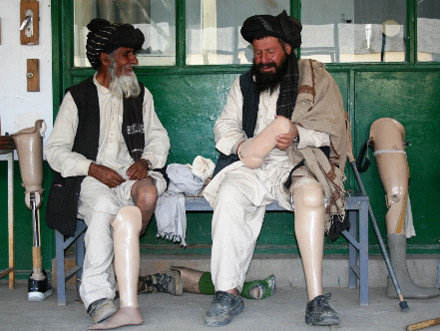The International Committee of the Red Cross (ICRC) has opened its seventh prosthetic and orthotic centre in Afghanistan to help rehabilitate permanently disabled people, but the man leading the programme says more centres are needed.

Two disabled men are fitting their artificial limbs at ICRC's orthopedic center in Kabul. (Photo: Akmal Dawi/IRIN)
Alberto Cairo, who has led ICRC’s orthopaedic programme in Afghanistan for 20 years, says he has never sat back for a moment at his busy duty station where new amputees seek artificial limbs every day.
“We’re always running here,” Cairo told IRIN at the centre in Kabul where over 300 staff, all of them with permanent disabilities, work.
The most recent ICRC prosthetic centre to open (in August) is in Lashkargah, capital of the southern province of Helmand. It has already dealt with over 60 amputees.
“It’s almost impossible for people in Marjah District [in Helmand Province] to bring their patients to Kabul,” Cairo, who speaks fluent Dari, said. “I think 6-7 more centres are needed.”
Over the past two decades almost 100,000 people have been assisted at ICRC’s orthopedic centres. Of these, over 24,667 were landmine victims and the rest were paraplegics or people disabled by war, polio or spinal injuries.
The ICRC spends about US$18 million on its orthopedic centres every year.
Rising casualties
As armed conflict intensifies, casualty figures are rising.
The number of civilians killed and wounded as a result of fighting rose by 31 percent in the first half of 2010 compared to the same period last year, the UN Assistance Mission in Afghanistan (UNAMA) reported.
The ICRC said the number of war casualties taken to a hospital it supports in Kandahar Province had risen sharply. Almost 1,000 war victims were registered at the hospital in August and September - 100 percent more than in the same period last year.
“We are receiving more double amputees [people losing both legs] which points to the severity of their casualties [caused by improvised explosive devices – IEDs],” said Cairo, adding that most victims (85 percent) were adult male.
“Not all of the war victims come to us… only those who need artificial limbs and orthopedic care,” he said.
Polio, a contagious and paralyzing disease among children, is mainly endemic in the insecure southern and eastern provinces.
Drop in landmine victims
More than two decades of demining has resulted in a marked reduction in the number of landmine victims.
Casualties have dropped from over 2,100 (deaths and injuries) in 2002, to 508 in 2009, according to a new report by the Mine Action Coordination Center of Afghanistan (MACCA).
From March 2008 to March 2009, over 21,187 anti-personnel mines, 626 anti-tank mines and 456,365 explosive remnants of war (ERWs) were destroyed by demining agencies.
However, over 6,700 hazardous articles (landmines, ERWs) still remain in some 650sqkm, which deminers intend to clear by 2013, depending on funding.
MACCA’s associate agencies do not destroy IEDs, which Taliban insurgents use widely to target Afghan and foreign forces but which often cause extensive casualties among civilians.
According to the UNAMA report, 374 civilians lost their lives in IED attacks between January and June 2010.
“Demining entities only clear mines and explosive remnants of war, which includes abandoned improvised devices outside conflict areas,” Mohammad Haider Reza, MACCA’s director, told IRIN.
“The good news is landmines harm fewer people than before. The bad news is IEDs and war kill and injure more people than before,” said one deminer who did not want to be named for security reasons.



